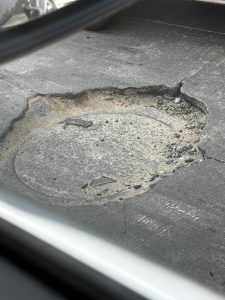
Killer Roads in J&K
News Kashmir Analysis
Road accident deaths or Traffic accident deaths are a grim tragedy of the world we live in . Jammu and Kashmir owing to its tough terrain has a very complex and sensitive Geography making our roads also dangerous. But owing to many other factors road accidents across Jammu and Kashmir have become a big menace. Even in plain areas many lives are lost in traffic accidents.
The facts and statistics in this regard are worrisome. The often road accident deaths especially in Chenab area is a matter of huge concern.
As a matter of fact, The
Jammu and Kashmir has witnessed a horrifying toll of 4251 road accident fatalities over the past five years, with the National Highway and the Chenab Valley region emerging as particularly treacherous zones, according to data released by the Traffic Department.
On an average, two individuals have lost their lives daily due to road accidents in Jammu and Kashmir since 2019, a very very grim reminder of the urgent need for improved road safety measures.
The National Highway, a crucial transportation artery, has emerged as a major hotspot for road accidents, accounting for a very large number of fatalities over the past five years.
In 2019, 211 lives were lost on this vital roadway, followed by 178 deaths in 2020, 271 in 2021, 261 in 2022, and a further 234 fatalities in 2023.
The Chenab Valley region, known for its treacherous terrain and winding roads, has also proven deadly for motorists and pedestrians.
In 2019, the area witnessed 113 road accident deaths, followed by 64 in 2020, 91 in 2021, 81 in 2022, and a spike of 114 fatalities in 2023. The data highlights the urgent need for targeted interventions and infrastructure improvements along these high-risk routes to prevent further loss of life.
Road accident deaths are also a big challenge for our beloved country India.
The “Road Accidents in India 2022” report, released in November 2023, said that the number of deaths reported in India due to road crashes in 2018 was 1,50,785 and it rose to 1,53,792 in 2021. The number was 1.3 lakh in 2010.
The need of the hour is to ensure building of quality roads everywhere, bringing end to rash driving and making giving driving license a very tough process then only we can find solution to increasing road fatalities.
Tragic accidents happen often. Just last month , Seven persons, including four members of a family, were killed in three separate road accidents in Udhampur, Jammu, and Reasi districts of Jammu and Kashmir on , officials said. A couple and their two daughters were killed and another one was injured after their car was hit by a truck in the Udhampur district of Jammu and Kashmir, the officials said.
The family from Jammu was on its way to Kashmir. The accident took place at Salore near Tikri along the Jammu-Srinagar National Highway shortly after midnight and the rescuers had a tough time retrieving the bodies from the badly crushed vehicle, they added.
One hopes increasing traffic accidents would be a matter of past soon .








